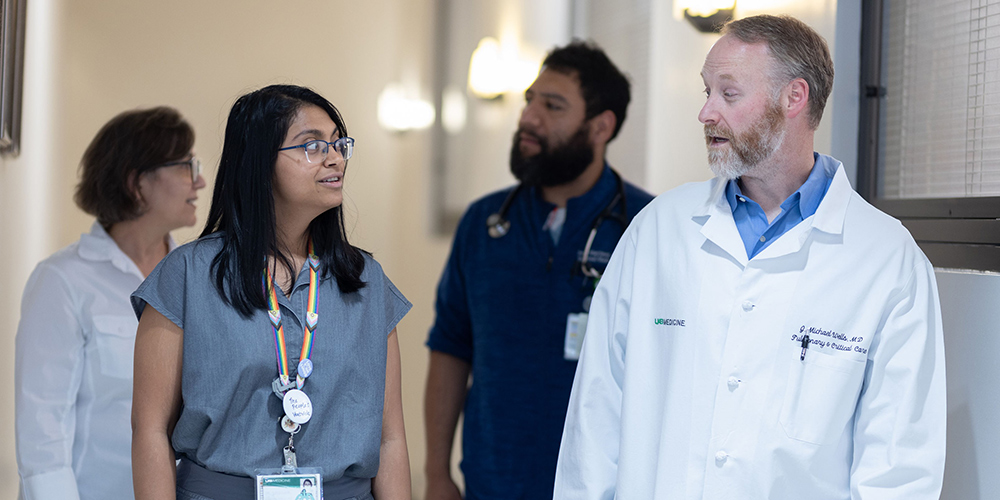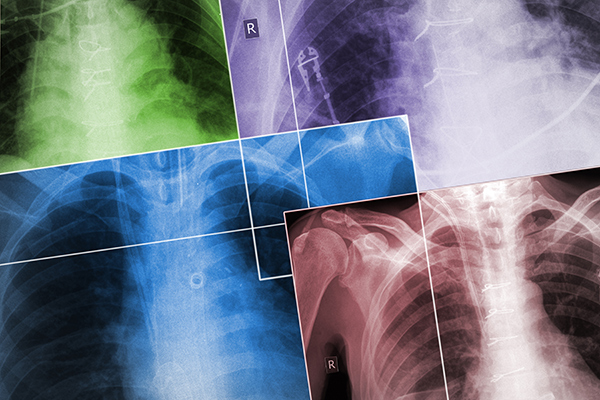The Lung Health Center (LHC) facilitates basic, clinical and translational, social and behavioral, and outcomes and health services research across respiratory conditions.

LHC conducts research across various respiratory conditions, including Alpha-1 Antitrypsin Deficiency, Asthma, Chronic Bronchitis, COPD, Emphysema, Critical Care and Illness Recovery, Interstitial Lung Disease, Lung Transplant, Pneumonia, and Thoracic Oncology.
Lung Health Center faculty members have been consistently ranked among the top programs for respiratory disease in the nation by US News and World Report and Best Doctors in America. Locally, our contributions to medical student and resident education are recognized year after year as among the best in the department and the medical center. Currently, the LHC supports 98 active research projects, many of them conducted in close collaboration with the Division of Pulmonary, Allergy and Critical Care Medicine and other clinical and basic science departments at UAB and other academic institutions.
Research Services
The LHC supports research that furthers knowledge about mechanisms of lung disease, therapies and behaviors that impact lung disease and its care, and benefits our patients and community, while providing a range of services to study investigators, such as spirometry, lung imaging, and genetics analyses support, which may involve a fee, and can be requested by filling out the LHC Services Request.
Request LHC Services
Our services include:
-
Participant Recruitment Services: We use a recruitment database and various platforms, including television, radio, campus announcements, and social media, to successfully recruit and retain participants for observational studies and drug and device trials.
-
Regulatory Services: We provide support for regulatory submission processes, data use agreements, confidential disclosure agreements, investigational drug applications, and investigational device exemptions, and the maintenance of regulatory and study participant binders.
-
Data Management Services: To enhance the rigor of studies and to meet NIH data management and sharing requirements, the LHC provides services for electronic data management, data entry/checking/cleaning, analysis, storage, and dissemination.
-
Biospecimen Repository and Laboratory Services: We maintain a biorepository of human samples from conditions including COPD, asthma, alpha-1 antitrypsin deficiency, pulmonary hypertension, respiratory failure, and participants without known lung pathology, available to investigators, and offers biospecimen banking services, protocol and assay development, and sample analysis.
-
Pulmonary Function Testing (PFT) Laboratory Services: We have a state-of-the-art PFT lab which can perform spirometry, body plethysmography, diffusing capacity of carbon monoxide (DLCO), impulse oscillometry, 6-minute walk tests, and cardiopulmonary exercise testing.
-
Lung Imaging: Collaborating with the UAB Lung Imaging Lab on the use of advanced imaging techniques and image processing to aid early diagnosis and phenotyping of COPD and other lung diseases, our center facilitates lung imaging modalities, including computed tomography, cardiac MRI, and nuclear imaging.
-
Integrative 'Omics Laboratory: This lab has expertise in ‘omics analyses as well as cell biology, genetic epidemiology, biostatistics, statistical genetics, computer programming, bioinformatics, and network theory.
-
Small Animal Cardiopulmonary Physiology Services: These services include but are not limited to mouse cigarette smoke exposure experiments, Millar catheterization, animal phlebotomy, tissue and specimen collection, wire myography, and experimental design.
-
Tobacco Treatment Services: An outpatient tobacco treatment service, including nicotine addiction assessment, nicotine replacement therapy, and counseling by a trained tobacco treatment specialist, is under development, as is a training program for Tobacco Treatment Specialists.
For more information, please contact Kate Davis, Clinical Research Coordinator.
Send an Email -
Social Determinants of Health (SDH) Core: The SDH Core helps investigators to measure the effects of social and environmental risks. The Core integrates data on social and environmental exposures with patient data to support research on lung disease etiology, progression, and outcomes.
Request SDH Services

For Investigators
How can we support you?
For Principal Investigators interested in requesting services or support.
Complete Form